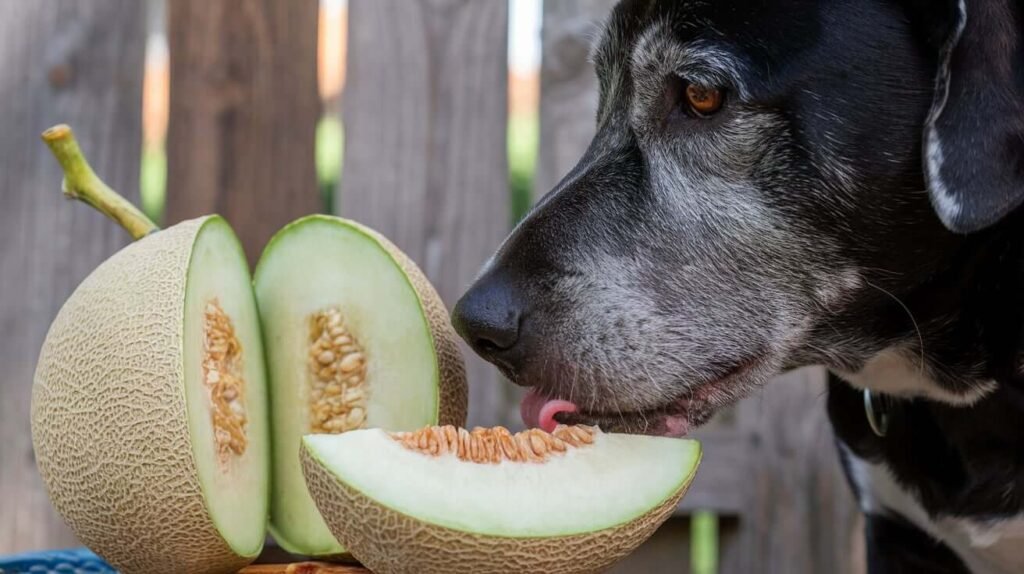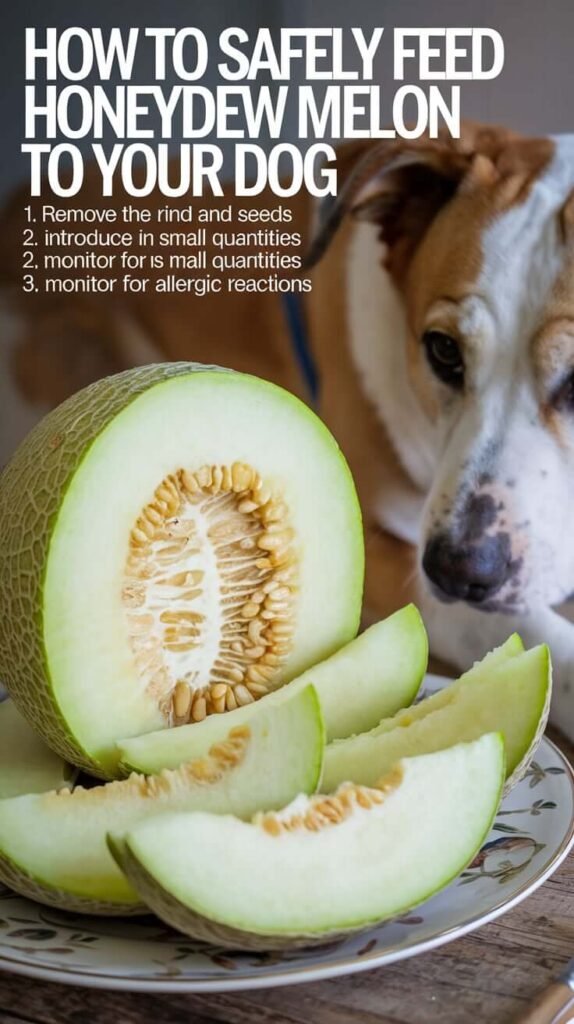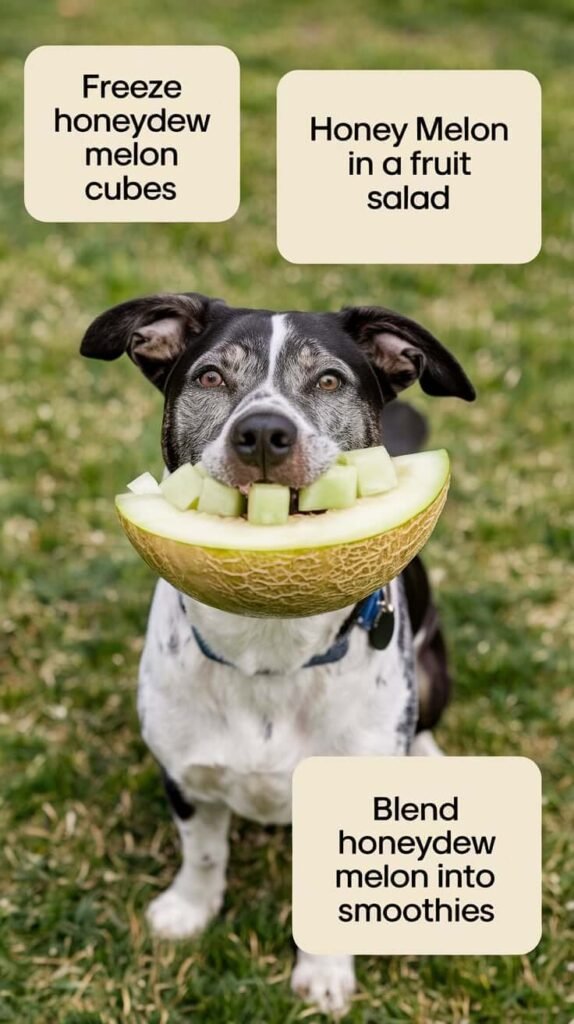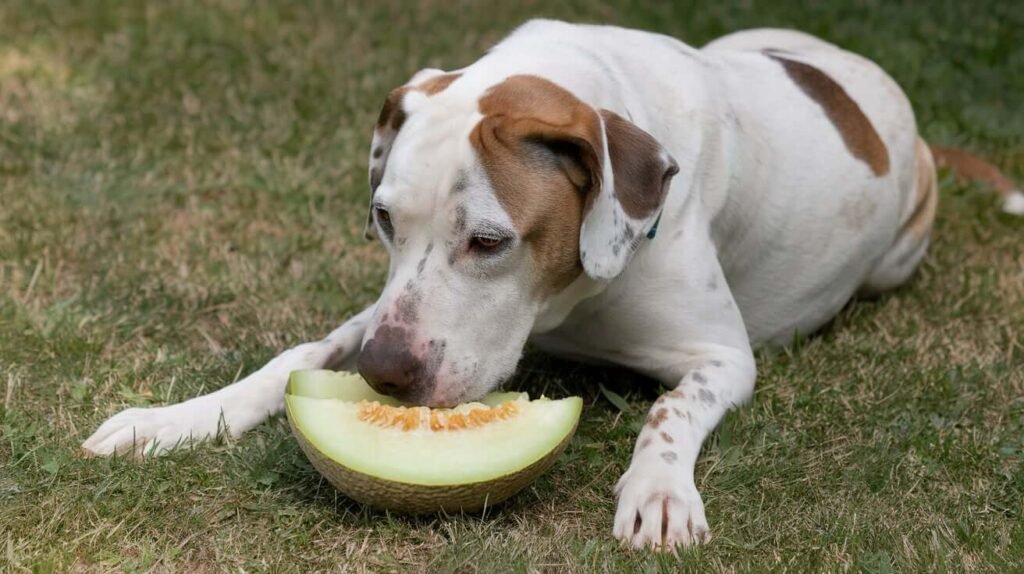Can Dogs Eat Honeydew Melon? 3 Powerful Ways to Safely Feed Honeydew Melon
Honeydew is a sweet and juicy fruit that many humans enjoy, but as responsible pet owners, we often wonder, Can dogs eat honeydew melon? are safe for our dogs. If you’ve ever thought about offering honeydew to your dog, this article will provide you with detailed and comprehensive information. We’ll dive deep into whether dogs can eat honeydew, its benefits, potential risks, and how to safely introduce it to your furry friend.

Table of Contents
- Can Dogs Eat Honey dew Melon? What is the Difference Between Honeydew Melon and Honeydew?
- Which Dogs Can Eat Honeydew Melon
- Which Dogs Should Avoid Honeydew Melon
- Is Honeydew Melon Safe for Dogs?
- Is Honeydew Good for Dogs?
- How to Safely Feed Honeydew Melon to Your Dog
- Potential Risks of Feeding Honeydew Melon to Dogs
- Can Puppies Eat Honeydew Melon?
- How Much Honeydew Melon Can I Give My Dog?
- When to Avoid Feeding Honeydew Melons to Your Dog
- Tips for Incorporating Honeydew Melon into Your Dog’s Diet
- Honeydew Melon and Hydration for Dogs
- Honeydew Melon as a Training Treat
- How Honeydew Melon Affects Senior Dogs
- Honeydew Melon and Dogs with Special Dietary Needs
- Honeydew Melon and Digestive Sensitivity
- Additional Tips for Feeding Honeydew Melon Safely
- Can Honeydew Melon Improve a Dog’s Skin and Coat?
- Can Dogs Eat Honeydew Melon and Cantaloupe?
- Can Dogs Eat Honeydew Melon Seeds?
- Can Dogs Eat Honeydew Melon Skin?
- Can Dogs Eat Rockmelon?
- Can Dogs Eat Melon Skin?
- Is Honeydew Melon Toxic to Dogs?
- Can Dogs Eat Honeydew Melon? What American Universities and Dog Doctors Say About It
- Differences Between Honeydew Melon, Cantaloupe, and Watermelon
- Which Melon is Best for Dogs?
- Alternatives to Honeydew Melon for Dogs
- Conclusion: The Sweet Spot of Honeydew for Dogs
- Frequently Asked Questions (FAQs) about Can Dogs Eat Honeydew Melon
Can Dogs Eat Honey dew Melon? What is the Difference Between Honeydew Melon and Honeydew?
The terms “honeydew” and “honeydew melon” are often used interchangeably, but they refer to the same fruit. There is no actual difference between honeydew and honeydew melon.
Here’s a clearer breakdown to avoid confusion:
Honeydew:
- Common Name: “Honeydew” is simply a shorthand or casual way to refer to the honeydew melon.
- Context: People may use “honeydew” in conversation or writing to talk about the fruit in a more informal context. For example, “I bought a honeydew at the store today.”
Honeydew Melon:
- Full Name: “Honeydew melon” is the full, formal name for the fruit.
- Context: It is used when being more specific, such as in recipes, nutrition discussions, or grocery listings, where the full name of the fruit is needed.
So whether you say honeydew or honeydew melon, you are talking about the same type of melon that has pale green flesh and a smooth, creamy rind.
Which Dogs Can Eat Honeydew Melon
- Most Dogs, Including Large Breeds: Dogs like German Shepherds, Labrador Retrievers, and Golden Retrievers can enjoy honeydew melon as a refreshing, low-calorie treat. It’s a good source of hydration and contains vitamins A and C as well as fiber.
- Small and Toy Breeds: Smaller dogs can also eat honeydew melon but should be given much smaller portions due to their size and dietary needs.
Which Dogs Should Avoid Honeydew Melon
Dogs With Sensitive Stomachs: Some dogs may experience gastrointestinal upset from new or sugary foods. If your dog has a history of digestive issues, it’s best to introduce honeydew melon slowly or consult with your vet.
Dogs With Diabetes or Weight Issues: Honeydew melon contains natural sugars, which can raise blood sugar levels. Dogs with diabetes or obesity should generally avoid it.
Is Honeydew Melon Safe for Dogs?
Yes, dogs can eat honeydew melon in moderation. Honeydew is not toxic to dogs and can provide them with a variety of nutritional benefits. However, as with any new food, it’s essential to understand the right way to introduce it and be aware of any potential risks.
Honeydew is rich in vitamins, minerals, and water content, making it a hydrating treat for your dog, especially during hot weather. Nonetheless, there are some precautions that pet owners should take when feeding this fruit to their dogs to avoid any health issues.
Is Honeydew Good for Dogs?
Yes, honeydew is generally safe for dogs to eat in moderation, as it is non-toxic and can be a refreshing treat.
Nutritional Benefits of Honeydew Melon for Dogs
Honeydew offers several nutritional benefits that can positively contribute to your dog’s health. Let’s take a closer look at some of the most important nutrients found in this fruit:

1. High Water Content: One of the primary benefits of honeydew is its high water content. Honeydew is made up of nearly 90% water, which makes it an excellent option for keeping your dog hydrated. If your dog is less inclined to drink water, adding some honeydew to their diet can be a fun way to help them stay hydrated.
2. Rich in Vitamins: Honeydew melon is packed with vitamins, particularly Vitamin C. While dogs produce their own Vitamin C naturally, a little extra from honeydew can provide an antioxidant boost, helping to strengthen the immune system and support overall well-being.
Additionally, honeydew contains moderate levels of Vitamin B6, which is essential for brain function and the production of red blood cells. This vitamin can aid in improving cognitive function and maintaining a healthy nervous system.
3. Dietary Fiber: Dietary fiber is another key benefit of honeydew melon. This fruit can help regulate your dog’s digestive system, promote healthy bowel movements, and prevent constipation. Fiber is important for maintaining gut health and ensuring that the digestive system functions smoothly.
4. Low in Calories and Fat: Honeydew is relatively low in calories and fat, making it a great choice for dogs that need to maintain a healthy weight. As an occasional snack, honeydew can satisfy your dog’s sweet tooth without contributing to obesity or other weight-related issues.
How to Safely Feed Honeydew Melon to Your Dog
When feeding honeydew to your dog, it’s important to do so safely and in moderation. Here are some tips on how to properly introduce honeydew into your dog’s diet:

1. Remove the Rind and Seeds
The first and most crucial step in feeding honeydew to your dog is to remove the rind and seeds. The rind of honeydew is tough, difficult to digest, and could pose a choking hazard. It can also cause gastrointestinal upset if ingested.
The seeds, while not typically toxic, can also present a choking risk, especially for smaller dogs. Always ensure the flesh of the fruit is cut into bite-sized pieces for easy consumption.
2. Introduce in Small Quantities
If your dog has never eaten honeydew before, start by offering a small amount and observe for any adverse reactions. Some dogs may be more sensitive to new foods, which can lead to digestive issues such as diarrhea or vomiting.
If your dog enjoys the honeydew and shows no negative side effects, you can gradually increase the amount offered, but always keep the portion size moderate.
3. Monitor for Allergic Reactions
While it’s rare, some dogs may have allergic reactions to new foods, including honeydew. After introducing honeydew, watch for signs of allergies, such as itching, swelling, or gastrointestinal upset. If you notice any unusual symptoms, stop feeding the fruit and consult your veterinarian.
Potential Risks of Feeding Honeydew Melon to Dogs
While honeydew is generally safe, there are a few potential risks to consider:
1. Overconsumption Can Lead to Digestive Upset
Although honeydew is low in calories and fat, overfeeding this fruit can lead to digestive issues such as diarrhea or upset stomach. The high water content, combined with the sugar found in the fruit, can overwhelm a dog’s digestive system if consumed in large quantities.
2. High Sugar Content
Honeydew is naturally sweet, and while its sugar content is lower compared to other fruits, it still contains enough sugar to be a concern, especially for dogs with diabetes or those prone to weight gain. It’s crucial to limit the amount of honeydew your dog eats and offer it as an occasional treat rather than a staple food.
3. Risk of Choking on Rind or Seeds
As mentioned earlier, the rind and seeds of honeydew should be removed before feeding it to your dog. Not only are they difficult to digest, but they can also cause choking, particularly in smaller dogs or those that tend to gulp down their food.
Can Puppies Eat Honeydew Melon?
While adult dogs can safely enjoy honeydew melon in moderation, you might wonder whether puppies can also partake in this juicy treat. The answer is yes, but with extra caution. Puppies have more sensitive digestive systems than adult dogs, so introducing any new food, including honeydew, should be done slowly and in very small amounts.
Make sure to cut the fruit into tiny pieces to prevent choking and monitor your puppy for any signs of digestive distress.
How Much Honeydew Melon Can I Give My Dog?
The amount of honeydew melon you can safely give your dog depends on their size and dietary needs. As a general rule of thumb, treats like honeydew should only make up around 10% of your dog’s daily caloric intake.
For small dogs, a few small bites of honeydew are sufficient, while larger dogs may be able to enjoy slightly bigger portions. Always adjust the amount based on your dog’s overall health and caloric intake to avoid overfeeding.
When to Avoid Feeding Honeydew Melons to Your Dog
While most dogs can safely enjoy honeydew melon, there are some situations where it might be best to avoid feeding it altogether. If your dog falls into any of the following categories, honeydew may not be the best choice:

1. Dogs with Diabetes
Due to honeydew’s natural sugar content, it may not be suitable for dogs that have been diagnosed with diabetes. Consuming fruits high in sugar can cause a spike in blood sugar levels, which can lead to complications in diabetic dogs. If your dog has diabetes, it’s essential to consult your veterinarian before introducing any sugary fruits, including honeydew melon, into their diet.
2. Dogs with Obesity Issues
Similarly, if your dog is overweight or has a tendency to gain weight easily, you should limit the amount of honeydew offered. While honeydew is low in calories compared to other snacks, it still contains natural sugars that can contribute to weight gain if fed in large amounts.
3. Dogs with Sensitive Stomachs
Some dogs have more sensitive digestive systems and may experience gastrointestinal upset when introduced to new foods. If your dog tends to have a delicate stomach or suffers from food allergies, you may want to avoid honeydew or any other fruits that could potentially cause digestive discomfort.
Tips for Incorporating Honeydew Melon into Your Dog’s Diet
If your dog enjoys honeydew and has no negative reactions, you can get creative with how you serve it. Here are a few ideas to make honeydew an even more exciting treat for your dog:

1. Freeze Honeydew Melon Cubes
For a refreshing treat on a hot day, consider freezing small cubes of honeydew. These frozen cubes can be a cool and hydrating snack that your dog will love, especially during summer. Just ensure the pieces are small enough to prevent choking.
2. Honeydew Melon in a Fruit Salad
If you regularly prepare fruit salads for yourself, you can set aside some dog-safe fruits like honeydew, apples, and watermelon to create a simple fruit salad for your pup. This provides variety and extra nutrition for your dog while keeping their meals interesting.
3. Blend Honeydew Melon into Smoothies
You can also blend honeydew with other dog-safe fruits and plain yogurt to create a smoothie for your dog. This can be an extra special treat that not only hydrates but also provides vitamins and nutrients from a variety of fruits.
Honeydew Melon and Hydration for Dogs
One of the standout benefits of honeydew melon is its hydration potential, especially for dogs that don’t drink as much water as they should. Dogs often need extra hydration during the hot summer months or after strenuous exercise. Honeydew melon, with its high water content, can act as a great natural hydrator.
If you notice your dog is not drinking enough water, incorporating honeydew melon (in moderation) into their diet can help maintain their fluid levels. Since dehydration can lead to serious health issues like urinary tract infections, kidney stones, and lethargy, adding small amounts of honeydew melon as a treat can make a difference.
Making a Honeydew Melon-Infused Ice Treat
To encourage hydration, you can make a honeydew-infused ice treat by blending honeydew melon with water and freezing the mixture in an ice cube tray. This is an excellent way to keep your dog cool during the summer while providing them with extra hydration.
Honeydew Melon as a Training Treat
Most dogs enjoy the sweet taste of honeydew, making it a useful training treat. When cut into small bite-sized pieces, honeydew melon can be a low-calorie reward for positive reinforcement. Many store-bought treats can be high in calories and fillers, so honeydew offers a healthier alternative.
However, it’s essential to ensure the fruit is portioned appropriately to prevent overfeeding during training sessions. Honeydew can be mixed with other low-calorie treats like carrots to offer variety without compromising your dog’s health.
Honeydew Melon Smoothie for Active Dogs
For dogs that are particularly active, blending honeydew with plain, unsweetened yogurt creates a nutrient-packed smoothie. This treat not only provides hydration but also gives a boost of protein from the yogurt. You can serve this after long walks or play sessions to help your dog cool down and refuel.
How Honeydew Melon Affects Senior Dogs
As dogs age, their dietary needs and digestive systems often change. Senior dogs may benefit from the fiber found in honeydew, as it can help regulate digestion and prevent constipation, which is more common in older dogs. However, be sure to give honeydew in small amounts, as older dogs may have more sensitive stomachs and be prone to digestive upsets.

If you have an aging dog, offering honeydew as a light, refreshing snack can help keep them interested in food and improve their gut health without overloading their system.
Honeydew Melon and Dogs with Special Dietary Needs
Dogs with specific dietary restrictions or those on prescribed diets may benefit from honeydew as an occasional treat. For example, dogs with food allergies to common ingredients like grains or certain proteins can still enjoy the sweet taste of honeydew without worrying about triggering their allergies. Honeydew is also a good option for dogs on low-fat diets since it contains virtually no fat and very few calories compared to traditional dog treats.
Feeding Honeydew Melon to Dogs on Raw Diets
For dogs on a raw or BARF (Biologically Appropriate Raw Food) diet, honeydew can complement the other foods they consume. Since raw diets are usually rich in proteins and fats, honeydew offers a fresh, hydrating contrast. It can be mixed in with raw meals or given as a standalone snack without disturbing the balance of a raw diet.
Honeydew Melon and Digestive Sensitivity
For dogs with digestive sensitivities, such as those prone to gastrointestinal upset, it’s important to approach feeding honeydew carefully. Honeydew is low in acidity compared to fruits like oranges or pineapples, which makes it a gentler option for sensitive stomachs. However, even low-acid fruits can cause issues in some dogs, so always test with a small portion first.
Signs of Digestive Issues to Watch For
If you do notice signs of digestive problems after feeding honeydew, such as diarrhea, vomiting, or gas, it’s best to discontinue the fruit and consult your veterinarian. Every dog’s tolerance varies, so monitoring their reaction to new foods is key to preventing discomfort or illness.
Additional Tips for Feeding Honeydew Melon Safely
To ensure your dog reaps the benefits of honeydew without the risks, here are a few extra tips:

1. Serve Honeydew in Moderation
Honeydew is a great snack, but overfeeding can lead to digestive upset or weight gain due to its sugar content. Stick to small, controlled portions.
2. Always Use Fresh Honeydew
While fresh honeydew is ideal, make sure you avoid feeding canned or processed honeydew. These products often contain added sugars, preservatives, and other ingredients that are harmful to dogs.
3. Consider Your Dog’s Unique Dietary Needs
Every dog is different, and while honeydew is safe for most, some may have unique health concerns that make it unsuitable. For example, dogs with diabetes, as mentioned earlier, should avoid sugary fruits. Always check with your vet if your dog has special health conditions.
Can Honeydew Melon Improve a Dog’s Skin and Coat?
Another potential benefit of honeydew melon is its contribution to skin and coat health. The high levels of Vitamin C in honeydew may support collagen production, which is crucial for skin elasticity and repair. Additionally, a well-hydrated dog often has healthier skin, which may reduce conditions like flaky skin or excessive shedding.
While honeydew melon alone won’t dramatically transform your dog’s coat, as part of a balanced diet, it can offer small yet helpful improvements in overall coat health.
Can Dogs Eat Honeydew Melon and Cantaloupe?
Yes, dogs can eat both honeydew melon and cantaloupe in moderation. These melons are similar in many ways, providing a hydrating, sweet, and healthy treat for dogs. Both honeydew and cantaloupe are low in calories and contain important nutrients such as vitamins A and C, which are beneficial for your dog’s health.
However, it’s essential to serve them properly. Remove the rind and seeds before offering these fruits to your dog to avoid any choking hazards or digestive issues. Like with any new food, introduce them slowly to monitor for any adverse reactions.
Can Dogs Eat Honeydew Melon Seeds?
No, dogs should not eat honeydew melon seeds. Although honeydew seeds are not toxic to dogs, they can pose a choking risk or potentially cause a blockage in the digestive tract if consumed in large quantities. Additionally, seeds can be difficult for dogs to digest, which may lead to gastrointestinal upset such as vomiting or diarrhea.

Always make sure to remove the seeds from the honeydew before offering it to your dog.
Can Dogs Eat Honeydew Melon Skin?
No, dogs should not eat honeydew melon skin. The skin of honeydew melon is tough, fibrous, and difficult to digest. It may cause a stomach upset, including vomiting or diarrhea, if ingested by your dog. In some cases, the rough texture of the skin may also lead to choking.

Always peel the honeydew melon and cut it into bite-sized, skinless pieces before offering it to your dog. This ensures that the fruit is easy for your dog to chew and digest.
Can Dogs Eat Rockmelon?
Yes, dogs can eat rockmelon (another name for cantaloupe). It is safe for dogs to eat in small amounts and can be a refreshing, low-calorie snack. Rockmelon contains vitamins A and C, which help support your dog’s immune system and overall health.
Like other melons, be sure to remove the rind and seeds of the rockmelon before serving it to your dog. The rind is difficult to digest, and the seeds can pose a choking hazard.
Can Dogs Eat Melon Skin?
No, dogs should not eat melon skin—whether it’s honeydew, cantaloupe, watermelon, or any other melon. The skin of melons is tough and difficult to digest, which can cause stomach upset, including vomiting or diarrhea. The skin may also be a choking hazard, especially for smaller dogs.
Always ensure that any melon you feed your dog is properly peeled, with the skin removed, to avoid any potential risks.
Is Honeydew Melon Toxic to Dogs?
No, honeydew melon is not toxic to dogs. It is completely safe for dogs to eat, as long as it’s prepared correctly. Honeydew melon provides hydration, vitamins, and fiber, all of which can be beneficial for your dog’s health. However, as with all fruits, moderation is key, as overconsumption can lead to digestive upset.
When feeding honeydew to your dog, always remove the rind and seeds, and offer the fruit in small, bite-sized pieces to avoid any choking hazards or digestive issues.
Can Dogs Eat Honeydew Melon? What American Universities and Dog Doctors Say About It
Honeydew melon is generally considered safe for dogs, but it’s important to know what experts, including veterinarians and academic sources, say about feeding this fruit to our furry friends.
Can Dogs Eat Honeydew Melon: What the Experts Say
- Veterinary Insights
- According to Dr. Jerry Klein, Chief Veterinary Officer of the American Kennel Club, honeydew melon is safe for most dogs and can be a hydrating, vitamin-rich treat. However, he emphasizes that moderation is key due to the fruit’s sugar content.
- Dr. Katy Nelson, a veterinarian and pet health expert, advises removing all seeds and the rind before feeding honeydew melon to dogs. The rind can cause digestive issues, while the seeds may pose a choking risk.
- Research and University Perspectives
- Cornell University College of Veterinary Medicine highlights that fresh fruits like honeydew melon can be healthy treats for dogs, as long as their core diet is balanced and the fruit is given as an occasional snack.
- Colorado State University Veterinary Teaching Hospital adds that sugary fruits should be given sparingly, especially to dogs with conditions like diabetes or obesity. They recommend consulting your veterinarian before adding new foods to your dog’s diet.

References
- American Kennel Club (AKC) – Expert guidance on safe fruits for dogs.
- Cornell University College of Veterinary Medicine – Research on canine nutrition and treats.
- Colorado State University Veterinary Teaching Hospital – Insights on dietary considerations for dogs.
Always consult your own veterinarian for personalized advice based on your dog’s specific health needs.
Differences Between Honeydew Melon, Cantaloupe, and Watermelon
Understanding the differences between various melons can help you make informed decisions about which is best for your dog.
Honeydew Melon:
- Color: Honeydew melon has pale green flesh with a smooth, light yellow or green outer rind.
- Flavor: Honeydew is sweeter than cantaloupe and milder in flavor.
- Nutritional Benefits: Honeydew is a good source of vitamin C, which supports your dog’s immune system and helps with skin and coat health. It also contains potassium, which can aid in muscle function and fluid balance in dogs.
- Water Content: Like most melons, honeydew has a high water content, making it an excellent snack for keeping dogs hydrated. The water content in honeydew is roughly 90%, which makes it a great option for dogs that need extra hydration.
Cantaloupe (Rockmelon):
- Color: Cantaloupe has orange-colored flesh with a netted, rough, and tan outer rind.
- Flavor: Cantaloupe is sweet and more aromatic than honeydew, often considered richer in flavor.
- Nutritional Benefits: Cantaloupe is high in vitamin A and beta-carotene, both of which are essential for eye health and immune system function in dogs. It also contains antioxidants that may help fight inflammation and reduce the risk of chronic diseases.
- Fiber Content: Cantaloupe has a slightly higher fiber content than honeydew, making it useful for promoting healthy digestion, especially for dogs that need a fiber boost.
Cantaloupe is often considered the better melon for dogs due to its lower sugar content compared to honeydew. However, both melons are nutritious and hydrating, and the choice often comes down to your dog’s taste preference.

Watermelon:
- Color: Watermelon has vibrant red or pink flesh with a smooth, thick, green rind.
- Flavor: Watermelon has a crisp, juicy texture with a subtle sweetness. It’s less sweet than honeydew or cantaloupe but still very refreshing.
- Nutritional Benefits: Watermelon is low in calories and is an excellent source of vitamins A, B6, and C. It also contains lycopene, an antioxidant that can support heart health and reduce inflammation. Like honeydew, watermelon is also rich in potassium and helps with hydration due to its high water content (about 92%).
- Safety Considerations: As with honeydew, it’s essential to remove the seeds and rind when feeding watermelon to your dog. The seeds can block the intestines, and the rind is difficult to digest.
Which Melon is Best for Dogs?
All three melons—honeydew, cantaloupe, and watermelon—are safe for dogs to eat in moderation, provided the rind and seeds are removed. Each melon has its unique benefits:
- Honeydew: High in vitamin C and potassium, great for hydration.
- Cantaloupe: Rich in vitamin A and beta-carotene, beneficial for eye health and digestion.
- Watermelon: Low in calories, with the highest water content, making it excellent for hydration.
If you’re looking for the best option for dogs with sensitive stomachs or those on a low-sugar diet, watermelon is usually the safest bet due to its lower sugar content and high water level. Cantaloupe is ideal for dogs that need more fiber or vitamin A, while honeydew is a sweeter treat, great for dogs that need extra hydration.
Alternatives to Honeydew Melon for Dogs
While honeydew can be a healthy snack, there are many other dog-safe fruits that you might want to consider. Offering a variety of fruits can give your dog different nutrients and flavors while keeping their diet interesting. Below are some great alternatives:
1. Apples
Apples are rich in vitamins A and C and provide a good source of dietary fiber for dogs. Just be sure to remove the seeds and core, as apple seeds contain cyanide, which is toxic to dogs.
2. Blueberries
Blueberries are a superfood for dogs, packed with antioxidants, fiber, and vitamins. They can help support your dog’s immune system and overall health. Blueberries are also low in calories, making them an excellent snack for dogs that need to manage their weight.
3. Watermelon
Watermelon is another hydrating fruit similar to honeydew. Like honeydew, it has high water content, but it is important to remove the seeds and rind before offering it to your dog. Watermelon is a great low-calorie snack that can help keep your dog cool during hot days.
4. Strawberries
Strawberries are a tasty and nutritious treat for dogs. They are high in fiber and Vitamin C, and their natural sweetness can be appealing to your dog. However, strawberries should be fed in moderation due to their sugar content.
5. Bananas
Bananas are a popular choice for dog treats because they are rich in potassium, Vitamin B6, and Vitamin C. They are also easy to prepare and can be mashed into your dog’s food or frozen for a cool summer snack.
Conclusion: The Sweet Spot of Honeydew for Dogs
Honeydew is a sweet and beneficial treat for dogs when served in moderation and with proper preparation. It provides hydration, vitamins, and fiber that contribute to overall health, especially in active or older dogs. Whether used as a cooling summer treat, a training reward, or a healthy snack for dogs on special diets, honeydew can be a versatile option.
Remember to always monitor your dog for any adverse reactions when introducing new foods, and if you’re unsure, consult your vet before making honeydew a regular part of your dog’s diet. As long as the proper precautions are taken, your dog can safely enjoy this tasty and nutritious fruit.
Frequently Asked Questions (FAQs) about Can Dogs Eat Honeydew Melon
Can Dogs Eat Cantaloupe or Rockmelon?
Yes, dogs can eat cantaloupe (or rockmelon) in moderation. Like honeydew, cantaloupe is a hydrating and healthy fruit that provides vitamins and fiber. Be sure to remove the rind and seeds before offering it to your dog to avoid choking hazards or digestive issues.
Is Honeydew Toxic to Dogs?
No, honeydew is not toxic to dogs. It is safe for them to eat, but it should be served in moderation. Overfeeding honeydew or any other fruit can cause digestive upset, so it’s important to feed it as a treat rather than a regular part of their diet.
Can Cats Eat Honeydew?
Yes, cats can eat honeydew in small amounts. Although cats are obligate carnivores, they can occasionally enjoy fruits like honeydew. However, honeydew should not be a regular part of their diet, and it should always be offered in moderation.
How Much Honeydew Can I Give My Dog?
Honeydew should be given in small, bite-sized pieces and only as an occasional treat. A few small pieces are sufficient, as overfeeding fruit can lead to digestive upset or contribute to excessive calorie intake.
What Are the Benefits of Honeydew for Dogs?
Honeydew provides several benefits for dogs, including hydration, fiber, and vitamins like A and C. It is low in calories and fat, making it a healthy snack for dogs. The high water content can also help keep your dog hydrated, especially during warm weather.
Can Dogs with Diabetes Eat Honeydew?
Dogs with diabetes should consume honeydew sparingly. While it is low in calories, honeydew contains natural sugars that could affect blood sugar levels. Always consult with your veterinarian before feeding honeydew or any fruit to a dog with diabetes.
Can I Freeze Honeydew for My Dog?
Yes, you can freeze honeydew for your dog. Freezing small pieces of honeydew can make for a cool and refreshing treat, especially during the hot summer months. Just be sure to remove the seeds and rind before freezing and serving.







